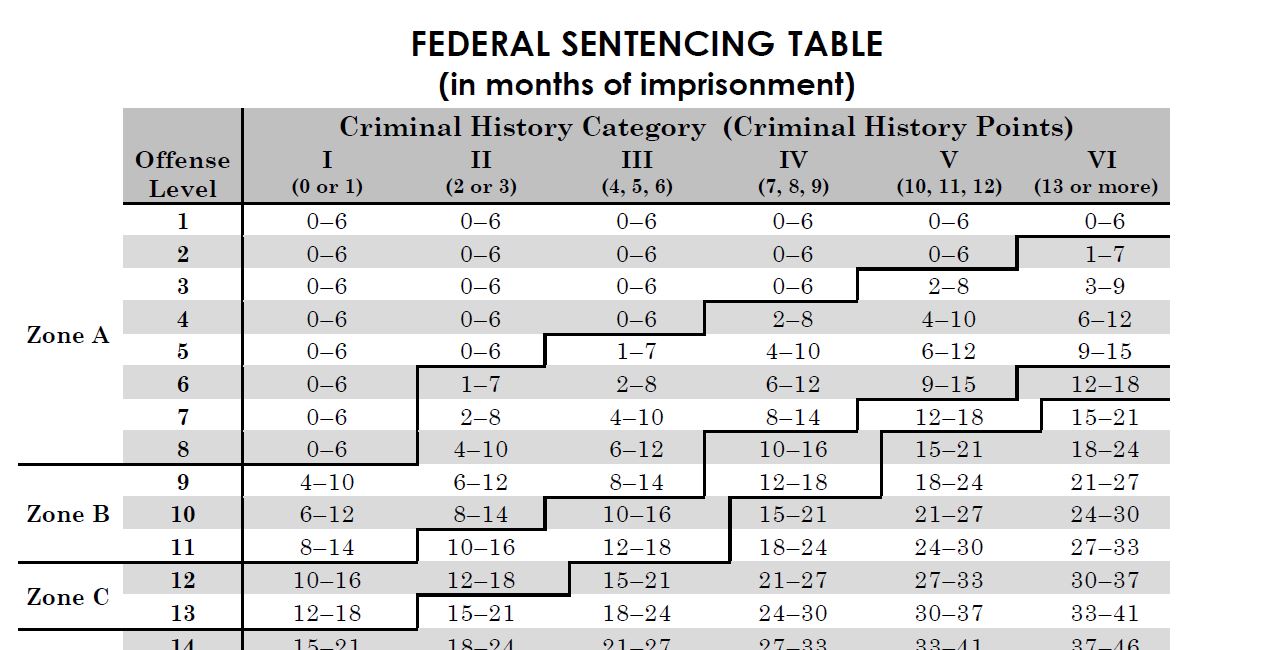Status Points and the United States Sentencing Guidelines
If I’ve already been sentenced, can I get time off based on the removal of status points from the United States Sentencing Guidelines?

Retroactive Elimination of Status Points
What does removing status points mean for currently charged defendants and those serving sentences in the Bureau of Prisons (BOP)? As more fully explained below, removing status points from the U.S. Sentencing Guidelines means shorter potential sentences for those defendants under current prosecution and, possibly, a reduction in sentence for inmates serving time in the BOP. Federal inmates can now file motions for reductions in their prison sentences due to the retroactive elimination of status points.
Federal inmates can file motions to reduce their sentences starting February 1, 2024, based on the retroactive change in the Sentencing Guidelines removing status points.
What are the U.S. Sentencing Guidelines?
The United States Supreme Court and the Sentencing Commission created Sentencing Guidelines to provide judges, such as those in the United States District Court in Michigan, a framework to determine appropriate sentences for convicted individuals based on the seriousness of the crime and the offender’s criminal history. Scoring the guidelines is highly complex and frequently requires high-level litigation between the U.S. Attorney’s Office and defense counsel to assist the judge in making informed decisions. Because judges are often conservative and helpful to the prosecution, only the most experienced, influential defense lawyers give their clients the best odds of winning scoring disputes.
What are “status points” under the United States Sentencing Guidelines?
“Status points” under the U.S. Sentencing Guidelines (U.S.S.G.) pertain to the specific situation where a defendant’s legal status at the time of the offense or previous legal status results in additional criminal history points. “Status points” is not an official term in the U.S.S.G. but is a colloquial reference to these specific points. Under the previous version of the guidelines, judges added two points to a defendant’s Criminal History score if the offender committed the instant federal offense while still serving a sentence in another case (for example, while on probation or parole). These additional points, formerly outlined in §4A1.1(d), are commonly referred to as “status points.” The Sentencing Commission’s retroactive elimination of status points opens the door for a federal inmate to file a Motion for Post-Judgment Reduction in Sentence.

Types of Status Points Under the U.S.S.G.
- Committing an Offense While Under a Criminal Justice Sentence: Two points are added if the defendant committed the instant offense while under any criminal justice sentence, which includes probation, parole, supervised release, imprisonment, work release, or escape status.
- Committing an Offense After Serving a Sentence and Within Two Years of Release: Two points are added if the defendant committed the offense less than two years after being released from imprisonment on a sentence of at least sixty days. This increases to three points if the sentence exceeds thirteen months.
- Committing an Offense While in Escape Status: Two points are added if the defendant committed the offense while in escape or attempted escape status.
- Revocations: Judges add two points if a probation, parole, or supervised release term was revoked (for any reason).
These “status points” are mainly focused on instances where the defendant’s legal or correctional status at the time of the offense (or previous status) adds to their criminal history points, reflecting a pattern of recidivism or offending while under court supervision.
What status points did the Sentencing Commission retroactively eliminate?
The Sentencing Commission abolished all status points for individuals with less than seven accumulated criminal history points, determining their criminal history category. Moreover, judges added one status point instead of two for those with seven or more points. The commission made this change because it determined that status points were not significantly relevant in accurately determining a criminal history profile.
Is the elimination of status points retroactive?
Yes, the removal or elimination of status points from the guidelines is retroactive. “Retroactive” in the context of changes made to the U.S. Sentencing Guidelines (U.S.S.G.) refers to applying specific guideline amendments to cases finalized before those amendments went into effect. In other words, when a change in the guidelines is deemed retroactive, defendants sentenced under the old guidelines might be eligible for a sentence reduction based on the newer, potentially more lenient provisions. All inmates whose guidelines increased due to status points may file motions to reduce their sentences starting on February 1, 2024.
“…defendants sentenced under the old guidelines might be eligible for a sentence reduction based on the newer, potentially more lenient provisions.”

Can my loved one’s sentence be reduced so they can get out of prison early?
If your loved one was given status points due to their status on probation or parole for a previous offense, they are eligible for a Motion to Reduce Sentence. The first step is to hire respected, experienced federal defense attorneys, such as the lawyers at LEWIS & DICKSTEIN, P.L.L.C. They file a persuasive, comprehensive, and legally compelling motion to reduce their client’s sentence when engaged in these matters. The firm’s lawyers have helped countless clients get sentence reductions in courts throughout Michigan. We have an unparalleled track record of achieving extraordinary post-judgment relief. Call us for a free consultation. We will take the time to talk with you, determine what options are available, and work with you to develop a winning strategy. If there is a way to help, we will find it!
Call us today at (248) 263-6800 for a free consultation or complete an online Request for Assistance Form. We will contact you promptly and find a way to help you.













